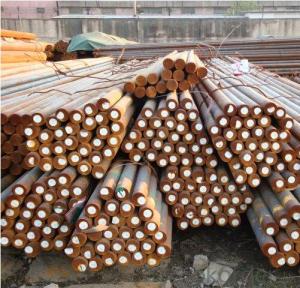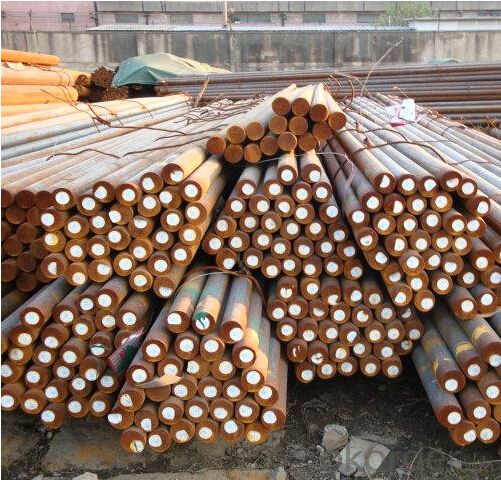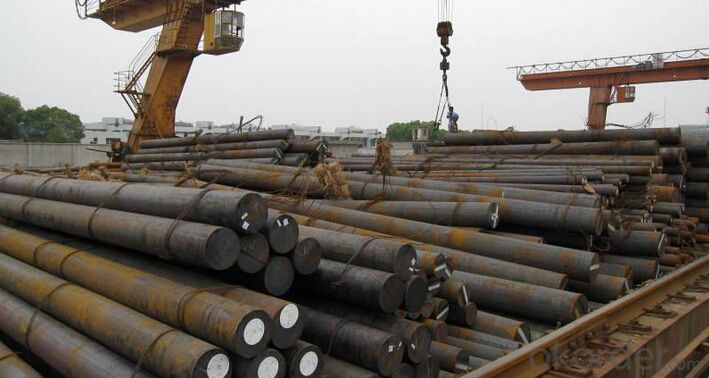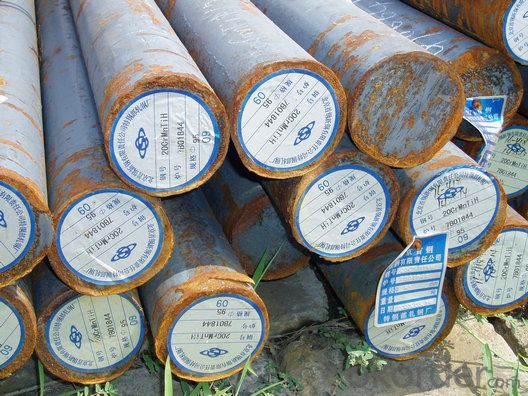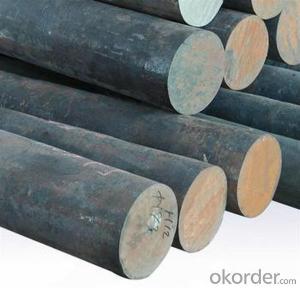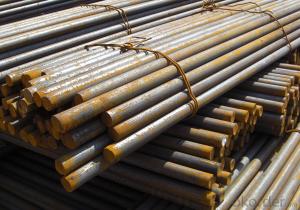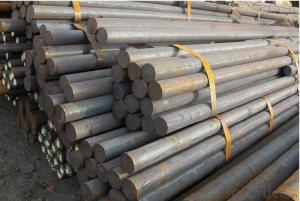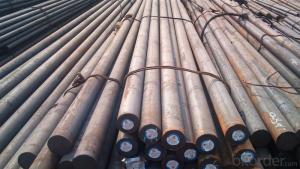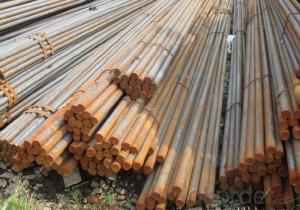Alloy Steel Cr12MoV Metal Steel Round Bars Special Steel
- Loading Port:
- China main port
- Payment Terms:
- TT OR LC
- Min Order Qty:
- 30 m.t.
- Supply Capability:
- 10000 m.t./month
OKorder Service Pledge
OKorder Financial Service
You Might Also Like
Specification
Chemical Composition(%)
| Country | Standard | C | Si | Mn | Cr | Mo | V | S | P | W |
| GB | C12MoV | 1.45-1.70 | ≤0.40 | ≤0.40 | 11.00-12.5 | 0.40-0.60 | 0.15-0.30 | ≤0.030 | ≤0.030 | |
| DIN | 1.2601 | 1.55-1.75 | 0.25-0.40 | 0.20-0.40 | 11.00-12.0 | 0.50-0.70 | 0.10-0.50 | ≤0.030 | ≤0.030 | 0.40-0.60 |
Available Size
| Rolled flat steel | 12-90mm×205-610mm×L |
| Forged flat steel | 100-300mm×400-600mm×L |
Heat Treatment
| Item | Temperature℃ | Hardness |
| Anneal | 850-880 | ≤255HB |
| Quenching | No.1:980-1040 | 60-63HRC |
| No.2:1050-1130 | 42-50HRC | |
| Tempering | No.1:200-300(1) | 57-60HRC |
| No.2:200-300(2-3) | 58-62HRC |
Characterstics
| 1.High hardening ability and abrasion resistance | ||||||||
| 2.Less quenching deformation | ||||||||
| 3.Higher toughness and more homogeneous carbide distribution than Cr12 steel |
Applications: Suitable for various complicated cold working dies with high precision and long lifetime,such as punching dies,cold extrusion dies,thread rolling dies,screw plates,cold extrusion dies,and precise measuring devices
Main Product
Plastic Mould Steel
DIN 1.2311,1.2738,1.2083,1.2316 etc.
AISI P20,P20+Ni,420 etc.
JIS SUS420J2
Hot Work Steel
DIN 1.2344,1.2343,1.2367,1.2365,1.2581,1.2713 etc.
AISI H13,H11,H10,H21, etc.
JIS SKD61,SKD6,SKD5,SKT4 etc.
Cold Work Steel
DIN 1.2739, 1.2601, 1.2080, 1.2436, 1.2631, 1.263, 1.2510, 1.2327 etc.
AISI D2, D5, D3, D6, A8, A2, O1 etc.
JIS SKD10, SKD11, SKD1, SKS3 etc.
High Speed Steel
DIN 1.3343, 1.3243, 1.3247, 1.3355 etc.
AISI M2, M35, M42, T1 etc.
JIS SKH51, SKH35, SKH59, SKH2 etc.
Alloy Structural Steel
DIN 1.7035,1.6511,1.7220,1.7225 etc.
AISI 5140, 4340, 4135, 4140 etc.
JIS SCr440,SNCM439,SCM435,SCM440 etc.
Stainless & Carbon Steel or Others
DIN 1.4125,1.1191 etc
AISI 440C,1045, 1020 etc.
JIS SUS440C,S45C etc
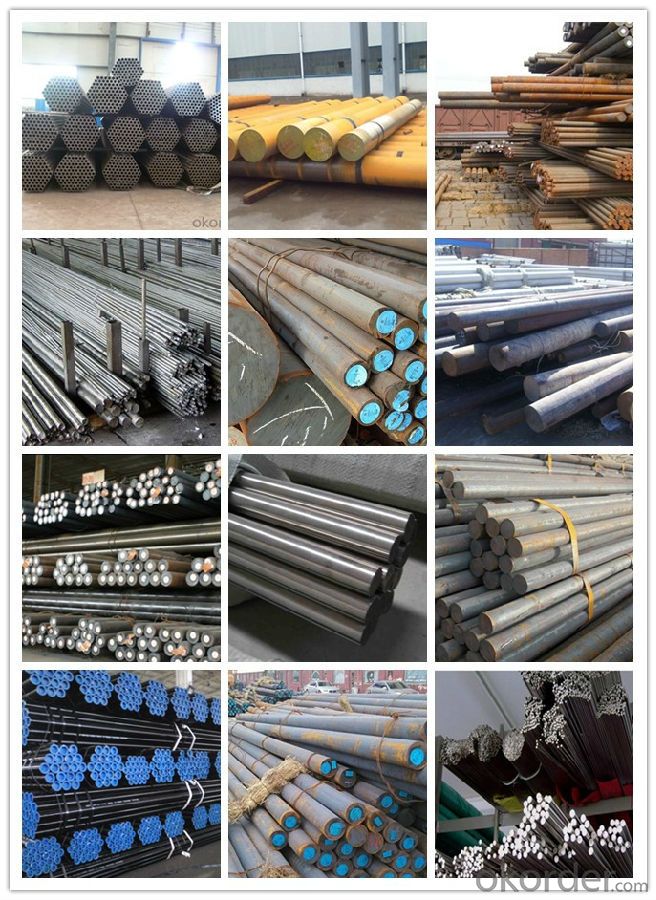 Product show
Product show
Workshop show
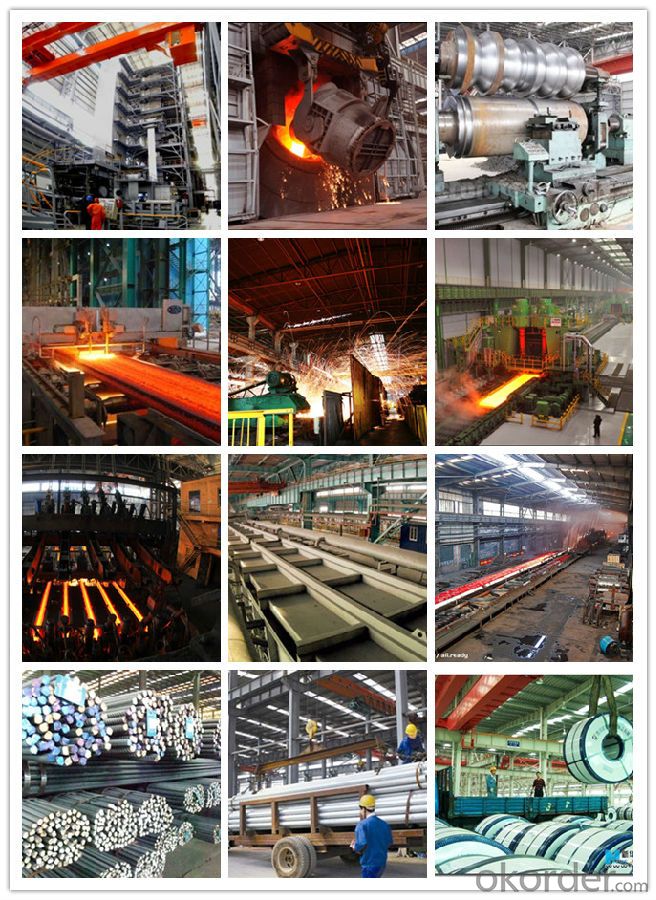
Shipping
1. FedEx/DHL/UPS/TNT for samples, Door-to-Door;
2. By Air or by Sea for batch goods, for FCL; Airport/ Port receiving;
3. Customers specifying freight forwarders or negotiable shipping methods!
Delivery Time: 3-7 days for samples; 5-25 days for batch goods.
Payment Terms
1.Payment: T/T, L/C, Western Union, MoneyGram,PayPal; 30% deposits; 70% balance before delivery.
2.MOQ: 1pcs
3.Warranty : 3 years
4.Package Informations: 1) EXPORT, In 20 feet (GW 25 ton) or 40 feet Container (GW 25 ton)
2)as customer's requirement
Why choose us?
(1) The leading exporter in China special steel industry.
(2) Large stocks for various sizes, fast delivery date.
(3) Good business relationship with China famous factories.
(4) More than 7 years steel exporting experience.
(5) Good after-sales service guarantee.
- Q: What are the requirements for special steel used in renewable energy equipment manufacturing?
- The requirements for special steel utilized in the manufacturing of renewable energy equipment differ significantly from traditional steel used in other industries. In order to meet the demanding nature of renewable energy equipment, the steel must possess certain unique characteristics and properties to ensure optimal performance and durability. 1. Excellent corrosion resistance is a necessity for special steel used in renewable energy equipment, as it must be able to withstand exposure to harsh environmental conditions. This is especially crucial for offshore wind turbines or solar panels that are installed in coastal areas with high salt content in the air. 2. The steel should possess high strength and toughness to withstand mechanical stresses and loads. Renewable energy equipment, such as wind turbine towers or hydroelectric dams, experiences significant forces such as strong winds, water pressure, or vibrations. Steel with high strength provides the necessary structural integrity to handle these forces. 3. Given the cyclic nature of renewable energy equipment, the steel must have excellent fatigue resistance. Wind turbines, for instance, constantly experience alternating loads due to wind gusts and rotational forces. Specially designed steel with fatigue resistance properties can prevent structural failures caused by repeated stress. 4. Weldability is a crucial requirement for the steel used in renewable energy equipment manufacturing. Many components of renewable energy systems require welding, and the steel must be easily weldable without compromising its strength or other properties. 5. The steel used in renewable energy equipment should align with the objective of environmental sustainability. Steel manufacturers are increasingly focusing on reducing the carbon footprint of their products by incorporating recycled content or adopting greener production processes. 6. Special steel used in renewable energy equipment must also be cost-effective while meeting all the aforementioned requirements. The steel should provide the desired properties at a reasonable cost to ensure the competitiveness and viability of renewable energy projects. To fulfill these requirements, steel manufacturers often develop specific grades or alloys tailored to the needs of renewable energy equipment manufacturers. These grades continuously evolve as the renewable energy industry advances, enabling the production of more efficient and durable equipment that supports the transition to clean energy sources.
- Q: What are the applications of special steel in the manufacturing sector?
- Special steel has a wide range of applications in the manufacturing sector, including the production of tools, machinery, automotive components, and construction materials. Its exceptional strength, durability, and resistance to corrosion make it ideal for manufacturing applications that require high performance and reliability. Furthermore, special steel can be tailored to specific requirements, enabling manufacturers to create customized products with enhanced properties, such as heat resistance or hardness. Overall, special steel plays a crucial role in various industries, contributing to the advancement and efficiency of the manufacturing sector.
- Q: How does special steel perform in extreme pressure conditions?
- Special steel offers exceptional performance in conditions of extreme pressure, thanks to its unique composition and manufacturing process. It possesses high strength, durability, and resistance to deformation, which make it ideal for applications involving extreme pressures. Under extreme pressure, special steel maintains its structural integrity without significant deformations. This is possible due to its impressive tensile strength, allowing it to withstand tremendous forces without breaking or bending. Furthermore, the hardness and toughness of special steel enable it to resist wear and damage caused by intense pressure. In addition, special steel exhibits excellent heat resistance, which is vital in extreme pressure situations where elevated temperatures are common. Its ability to withstand high temperatures without compromising its mechanical properties ensures its dependability and effectiveness even in the most demanding circumstances. Moreover, the corrosion resistance properties of special steel are outstanding, making it suitable for use in extreme pressure environments where exposure to corrosive substances is a concern. Its resistance to oxidation and other chemical reactions prevents deterioration or weakening, guaranteeing long-term performance and reliability. Overall, special steel excels in extreme pressure conditions due to its high strength, durability, resistance to deformation, heat resistance, and corrosion resistance. These characteristics make it a reliable and efficient choice for various industries and applications that operate in extreme pressure environments, including oil and gas exploration, aerospace, automotive, and heavy machinery manufacturing.
- Q: How is duplex stainless steel used in the oil and gas industry?
- Duplex stainless steel is commonly used in the oil and gas industry due to its unique combination of strength, corrosion resistance, and cost-effectiveness. It is utilized in various applications such as pipelines, offshore platforms, and equipment for drilling, extraction, and refining processes. Its resistance to corrosion and high mechanical strength make it suitable for withstanding harsh operating conditions, including exposure to corrosive drilling fluids and high-pressure environments. Overall, duplex stainless steel plays a crucial role in ensuring the integrity and reliability of oil and gas operations.
- Q: How does special steel perform in high-speed applications?
- Special steel performs exceptionally well in high-speed applications. Its unique composition and properties, such as high strength, hardness, and toughness, allow it to withstand extreme conditions, including high temperatures, vibrations, and stresses. This ensures reliable performance, minimal wear, and extended service life, making special steel an ideal choice for high-speed applications where precision, durability, and efficiency are critical.
- Q: How does special steel contribute to the dimensional stability of products?
- Special steel is known for its high strength, durability, and resistance to deformation, making it an ideal material for enhancing the dimensional stability of products. By utilizing special steel in the manufacturing process, products are less likely to experience changes in shape or size due to external factors such as temperature fluctuations or mechanical stress. This improved dimensional stability ensures that the products maintain their intended form and functionality over time, leading to increased reliability and customer satisfaction.
- Q: Can special steel be heat treated?
- Yes, special steel can be heat treated. Heat treatment is a process used to alter the physical and mechanical properties of steel by heating it to specific temperatures and then cooling it at controlled rates. This treatment allows for the adjustment of hardness, strength, toughness, and other desired characteristics in special steel.
- Q: How does special steel contribute to the electrical conductivity of products?
- Special steel contributes to the electrical conductivity of products by offering high levels of purity and low levels of impurities. Its composition and manufacturing process ensure that it has excellent conductivity and minimal resistance, allowing for efficient flow of electric current.
- Q: What are the main advantages of using special steel in the construction of bridges?
- The main advantages of using special steel in the construction of bridges are its exceptional strength and durability. Special steel alloys offer high tensile strength, allowing for lighter bridge designs and reducing the overall weight of the structure. This not only makes construction and transportation easier but also minimizes the environmental impact. Additionally, special steel exhibits excellent corrosion resistance, ensuring the longevity of the bridge even in harsh weather conditions. Its superior toughness and resistance to fatigue make it ideal for withstanding heavy loads and frequent use, ensuring the safety and reliability of the bridge for many years.
- Q: How is special steel used in the automotive industry?
- Special steel is used in the automotive industry for various applications such as manufacturing engine components, transmission systems, and chassis parts. Its high strength, durability, and resistance to corrosion make it ideal for ensuring the safety, performance, and longevity of vehicles. Additionally, special steel is used in the production of specialized tools and machinery required for automotive manufacturing processes.
Send your message to us
Alloy Steel Cr12MoV Metal Steel Round Bars Special Steel
- Loading Port:
- China main port
- Payment Terms:
- TT OR LC
- Min Order Qty:
- 30 m.t.
- Supply Capability:
- 10000 m.t./month
OKorder Service Pledge
OKorder Financial Service
Similar products
Hot products
Hot Searches
Related keywords
